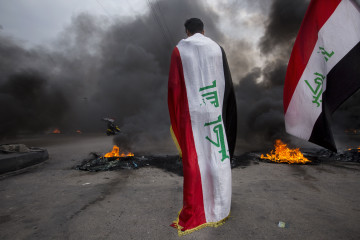

Hisham pushes open the door of the café, pokes his head inside, and looks around cautiously. He then walks briskly towards the table and casts a further suspicious glance around the room.
It is the first time in a month that the 43-years-old has come back to the Karrada neighbourhood in the centre of Baghdad.
“We are brave, but we are not bulletproof. So, we change our meeting places with colleagues and friends, we use fake names in phone calls, we change phone numbers,” he tells The New Arab.
Hisham was on the front line during the October Revolution in 2019, the anti-government protest movement that started in Baghdad and slowly died out a year later.
"We are brave, but we are not bulletproof. We change our meeting places with colleagues and friends, we use fake names in phone calls, we change phone numbers"
In addition to the 600 protesters killed during the protests, more than 35 activists have since died in targeted assassinations, according to the Iraqi High Commissioner for Human Rights.
Hisham lost his job as a journalist at an Iraqi newspaper due to his activism and lives in fear of being targeted. After living away from his wife and children for months to protect them, he has recently moved back to the suburbs of Baghdad.
With Iraq’s elections scheduled for 10 October, Iranian-backed Shia militias are more influential than ever. In mid-September, the powerful Shia paramilitary organisation, the Hashd al-Shaabi, or Popular Mobilisation Forces (PMF), announced the reinstatement of 30,000 of its ex-combatants who were decommissioned between 2015 and 2018.
The organisation is made up of armed groups containing around 160,000 fighters and has been integrated into the state after having fought against the Islamic State (IS) group.
“Coincidence or electoral investment?” asked the independent Iraqi site Al-Alam Al-Jadid following the announcement, clearly leaning towards the second option. For Hisham, it’s obviously an electoral strategy.
“Each of these 30,000 militiamen has a whole family behind him, who promised a vote to those responsible for the reintegration,” he says. “I am in touch with advisers of the prime minister, and I told them my opinion. But they cannot do anything because those armed parties are stronger than the government itself”.
In the last four months, the Green Zone in central Baghdad, which hosts foreign embassies and government buildings, has been occupied several times by militias, putting pressure on the government led by Prime Minister Mustafa al-Kadhimi.
Iraq regularly ranks near the top of the world’s most corrupt countries, and millions of dollars circulate through the hands of political parties dealing with armed groups.
The presence of armed militiamen among political ranks is precisely the reason why Hisham and other members of his party, the newly established Al-Beit Al-Watani (National Home), decided in May to boycott the election, despite calling for an early vote along with other activists.
“Yes, we wanted early elections, but safe and fair ones. In this environment there are elections, but there is not democracy,” he says. Al-Beit Al-Watani was born one year ago in September 2020.
Since the announcement of early elections in January, party members prepared all of the required documents to participate in the poll by supporting independent candidates. The decision to boycott was taken in May, and since then, their political action has run aground and its participants have dispersed.
"Yes, we wanted early elections, but safe and fair ones. In this environment there are elections, but there is not democracy"
Hisham hopes that between now and a potential future vote in four years he and the other members of Al-Beit Al-Watani will be able to rebuild a political base and contest the next elections.
Of course, it would have to be under certain conditions. First of all, safety for both the candidates and voters. But despite his daily efforts, Hisham does not know what the future of the movement is.
On 25 May, when activists tried to gather again in Baghdad and across Iraq chanting the same slogans of the October Revolution, participation was low, police repression was severe, and at least two people died.
“What is left from October 2019? Only desperation,” he sighs. Some of his friends want to vote, however, despite everything. “They say there is a little hope,” he laughs. “I tell them, there is no hope, only a train that will smash all people, and this train is called militias”.
For Hisham, who has always voted since being legally able to do so, this election will be disheartening. But he will be one of the millions of Iraqis boycotting the vote.
In the tense atmosphere that dominates Baghdad since electoral campaigning began, many fear that the election might not even reach the 44% turnout of the last poll in 2018.
Sofia Nitti is an Italian video journalist based in Baghdad, Iraq
Follow her on Twitter: @SofiaNitti





 Follow the Middle East's top stories in English at The New Arab on Google News
Follow the Middle East's top stories in English at The New Arab on Google News


